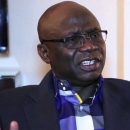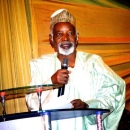The gay rights debate has opened up a profound moral divide in the Church of England. It is time for the bishops to take a stand
Tomorrow morning about a hundred middle-aged men and eight women will gather in central London to deliberate about homosexuality. Some will be gay themselves, though none openly. The men are the Church of England's bishops, the women are their advisers, and their debate for once is not an exercise in comic self-importance.
On the face of it, they are deciding whether to accept the recommendations of a committee that decided they should talk more about homosexuality. There is a small but determined faction that thinks they should not: the Bible has clearly condemned gay sex and there's an end to it. There is a possibly larger, less determined faction that thinks talking is a waste of time because 20 or 30 years' experience of openly gay people has shown some of them to be excellent Christians and human beings. There is a majority that will always want to talk, especially when the alternative is action. But the world has acted first.
The bishops are meeting in the wake of the legalisation of same-sex marriage, which represents an irrevocable move towards the acceptance of gay people in this country. But they are also meeting in the shadow of astonishingly homophobic laws supported by two of the largest Anglican churches in Africa – in Nigeria and Uganda.
The Nigerian law has passed with overwhelming support (1% of the Nigerian population is in favour of "society accepting homosexuality", according to the Pew Foundation). The marginally more liberal Ugandan government (where 4% of the population accepts homosexuality) has just rejected a similar law.
In Britain, where the Pew figures say that over 70% of the population is pro-gay rights, a number of conservative evangelical churches have aligned themselves with Uganda and Nigeria as a pre-emptive strike against the C of E recognising same-sex marriage. Although tomorrow's meeting will dodge the question, there will be clergy queueing to marry their same-sex partners when this becomes legal in April, when the question can no longer be dodged.
This is a profound moral divide, which means there are virtues on both sides – but you have to decide on which side to stand. You can't straddle the line and pick the best bits of both positions, because they are incompatible. One offers an ideal of human relationships based on free choice between equals; the other, an idea of freedom that derives from the recognition of necessity.
This older, hierarchical order has merits. We are not in fact equals – the world is full of imbalances of power: structural, political and economic, and sometimes simply emotional. To recognise and offer distinct roles around these can allow love to flourish, whereas a sexual ethic based on the ideal of transactions between freely consenting equals leads to a market; and in any market people get variously screwed, and the weakest get thoroughly screwed over.
But at the same time an ethic based on responsibility and obedience, like old-fashioned patriarchy, leads just as easily to the exploitation of the weak. The whole wider feminist movement is a revolt against that fact. We've learned that and we can't go back. Nor should we dream of doing so.
The law in Nigeria and the proposed law in Uganda are iniquitous. They must be rejected by anyone who believes in justice and human dignity. There are many in the C of E – among them Justin Welby, the archbishop of Canterbury – who sincerely admire the courage, faith and energy of the African churches. Welby himself has several times risked his life in the cause of reconciliation and it would be arrogant and wrong to claim that African churches' wicked views of homosexuality outweigh the good they do. But their views are still wicked, and the church here must clearly reject them.




